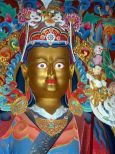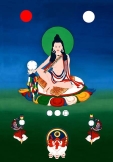Nyingma Tradition - lineage of Khyungchen Aro Lingma
The Nyingma Tradition

The Nyingma Tradition originates from Buddha Padmasambhava, who came to Tibet in the year 817 CE (AD) at the request of Chögyal Trisong Détsen. Padmasambhava—in collaboration with Shantarakshita and Trisong Détsen—built Samyé monastery, which became a principal centre of learning and the site where many of the texts that would make up Tibet’s vast Buddhist literature were first translated into Tibetan.
Padmasambhava is the Tantric Buddha – the second Buddha, who brought the teachings of the Nine Yanas of Buddhism to Tibet and the entire trans-Himalayan area. He founded the two sanghas: the red sangha of monks and nuns, and the gö-kar chang-lo’i dé, the white sangha or ngak’phang sangha of ngakpas and ngakmas, naljorpas and naljormas.
Padmasambhava gave widespread teachings of the three Inner Tantras to Yeshé Tsogyel and to his twenty-five principal disciples. These first Tibetan siddhas are renowned for their spiritual accomplishments.
The Aro Lineage

Aro is a Tibetan Vajrayana Buddhist tradition whose unusual characteristics make it singularly appropriate for many Westerners. Aro is principally concerned with transforming our experience of everyday being, rather than achieving an esoteric or spiritualised mode of existence. Our aim is to engender cheerful courage, perceptive consideration, sincere determination, natural gallantry, graciousness, creativity, and spaciousness.
The Aro teachings descend from a lineage of enlightened women – beginning with Yeshé Tsogyel. She was the female Tantric Buddha, who—together with Padmasambhava—founded the Nyingma tradition of Buddhism. Aro is a small family lineage within that tradition – founded by the female visionary Lama Aro Lingma in 1909 (picture left). The Aro Lineage Lamas are Ngak’chang Rinpoche and Khandro Déchen, a married couple with one daughter, who live in Penarth, South Wales.
There are three distinct yet compatible approaches within Buddhism: self-liberation, transformation, and renunciation. Aro emphasises self-liberation and transformation, whereas it is more common to prioritise renunciation. more on the principles of the three yanas
Aro emphasises simplicity, clarity, and depth – both of practice and understanding. To wield the essential functions of Buddhism is the Aro mode of practice. To grasp the essential principles of Buddhism is the Aro mode of study.
Dzogchen is ‘complete’ in that all other Buddhist teachings are contained within it. All Aro teachings—whether on Dzogchen, Tantra, or Sutra—are rooted in the Dzogchen perspective. Aro is quite unusual in teaching even basic concepts of Sutra, such as the Four Noble Truths and Five Precepts, from the point of view of Dzogchen
The lineage sangha is very active in providing a huge amount of information on the Internet, using a range of media and offers audio instruction and a free on-line course in meditation.
Sutra, Tantra and Dzogchen
“The nine vehicles of the Nyingma School can roughly be described as the three vehicles of Sutrayana, and the six vehicles of Vajrayana – the three Outer and three Inner Tantras. The highest Inner Tantric vehicle, Ati yoga, can also be called Dzogchen. When Dzogchen is viewed as a path in its own right, we talk about the three vehicles of Sutra, Tantra, and Dzogchen, rather than about Sutrayana and Vajrayana. Sutra incorporates all teachings and practices of the path of renunciation with the experience of emptiness as their fruit. Tantra embraces all the teachings and practices that use symbolic method as the path of transformation. Dzogchen includes all teachings and practices that provide an opportunity for direct introduction into the experience of non-duality.” (Spacious Passion, Chapter II, ‘Sky Mind’)
Practice Groups
All meetings will alternate Yogic song and silent sitting. No previous experience of Vajrayana practice or meditation is needed. We can intersperse discussion with practice to assist anyone new to the style of practice and give instruction in Shi-mè. We can also give personal instruction. Sessions are in the home of apprentices/disciples of Lamas of the Aro sangha. Sessions will be on the third Sunday of each month at 10, St. George”s Road, Hayle. email or telephone 07980 486245 for confirmation and confirm your wish to attend. dates of events in the UK and elsewhere.
In Sutric dön-pa it is the meaning of the words which is the focus. In Tantric dön-pa the words are used as a guide to visualisation. The melody is employed in order to give power to the words – to animate them.
Yang or Dzogchen Gardang are terms we usually translate as yogic song. There is no translation in English for these words as they do not equate to anything within Western religions or spiritual traditions. With yang there is no concept – it is a Dzogchen practice. The primary function is finding the presence of awareness in the dimension of the sound. For this transmission is required, both for the method and for the vajra melody of the yang. more on Yogic song.
Meditation, or “silent sitting” can take different forms depending on the practitioner’s development (or lineage, for others). We start with Shi-nè: a process of allowing any thoughts to arise, then letting them go. This is repeated continuously throughout the period of silent sitting. Guidance will be given to approach Shi-nè from different directions. The item on Shi-nè gives further explanation and depth. You can also follow a free non-sectarian online course in meditation.
Online teachings
A wonderful set of videos explaining one idea or group of ideas at a time. Scroll down to find such basics as the 4 Noble Truths, the 8-fold way, emptiness.
The whole content, chapter by chapter of Ngakma Nor”dzin”s book: a lovely introduction to the “4 Noble Truths”.
Online events and other sessions
All can be found at https://aroterlineage.org/en/events/ with an advanced search facility.
Monday meditation with Ngakma Nor’dzin and Ngakpa ’ö–Dzin
Podcasts
Some excellent podcasts, interviews and readings.
Drala Jong
Drala Jong is a Buddhist Retreat Centre in Wales. Drala Jong is a place where human beings can discover the pleasure of existence — the pleasure that animates the sense fields and revitalises the Arts — and the art of living.
Aro Ling Centre in Bristol
Aro Ling is a Buddhist bookshop and meditation equipment supplier, offering teachings and retreats at 215A Gloucester Road Bristol, BS7 8NN not far from Bristol City Centre.
Aro Ling is an idea: that openness and appreciation – life and art – are inextricably intertwined, and that the process of discovering that fact can be a joyful one, shared with friends.
